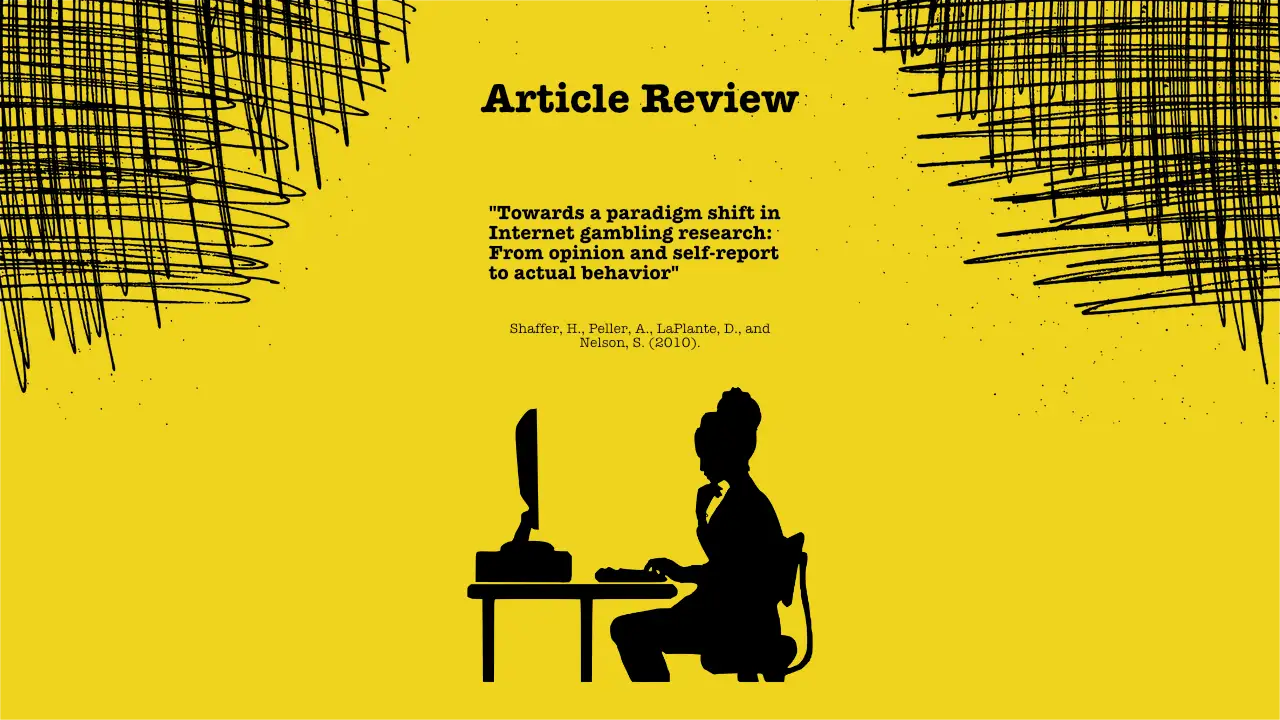Internet gambling offers unprecedented opportunities for academic research. One of the most significant developments in this area is the emergence of account-based reporting, which allows researchers to analyze players’ actual gambling behaviors rather than relying solely on what participants self-report. This shift represents a major methodological advance in gambling studies, enabling more accurate and data-rich insights into gambling patterns, risk behaviors, and intervention outcomes.
While earlier research depended on surveys and interviews, the account-based approach offers a deeper understanding of behavioral data at both the individual and population (big data) levels. It also facilitates precise evaluation of intervention strategies and harm-reduction techniques. The findings discussed in this article, following Shaffer et al. (2010), lay a foundation for identifying emerging trends in sports betting and online gambling behavior.
Key Ideas
1. Policy shaped by convention rather than data
Policymakers have traditionally relied on professional opinions, conventional wisdom, and subjective judgments when designing Internet gambling regulations. This reliance often results in rules that reflect perception more than measurable evidence.
2. Structural risks in Internet gambling
Excessive betting behavior is largely driven by the structural characteristics of online gambling platforms—specifically, their rapid event frequency and high payout ratios. These features sustain engagement and make it easy for players to place repeated bets with minimal downtime.
3. Strengths and weaknesses of self-reported studies
Self-reported studies remain useful for examining gamblers’ attitudes, intentions, and motivations. However, they suffer from major limitations, including:
- Self-selection bias and low response rates;
- Memory errors and self-presentation bias;
- Miscomprehension of survey questions;
- Limited visibility into actual behavior.
The primary weakness is clear: self-reporting cannot accurately capture how people gamble, only how they say they gamble.
4. The value of account-based reporting
Account-based data overcomes these limitations by offering a direct record of real behavior. It establishes an evidence-based foundation for gambling research and supports both micro- and macro-level analysis:
- Individual behavior patterns can be precisely tracked over time.
- Aggregated data enables the identification of broader population trends.
Such data also allows researchers to evaluate the effectiveness of interventions, such as deposit limits or self-exclusion tools, with measurable precision.
5. Integrating account-based and self-reported data
Rather than replacing traditional methods, account-based data can complement self-reported studies. Combining the two allows researchers to test, refine, or challenge existing assumptions about gambling motivations, psychological factors, and risk levels.
6. Differentiating risk and resilience
For meaningful analysis, it is crucial to differentiate samples based on risk and resilience. Account-based records enable researchers to identify behavioral markers of problem gambling and protective factors among low-risk players, advancing targeted prevention and support initiatives.
Selected Citations from Shaffer et al. (2010)
- “Internet gamblers report preferring the convenience of Internet gambling to land-based casinos.”
- “It might be possible to identify high-risk gamblers early in their involvement with Internet gambling because all of their activities can be monitored and tracked.”
- “Subscribers [of Bwin] lost more money on sports gambling than on casino gambling. This is not because the casino has greater losses. In fact, the house odds for casino play are less than half the house cut on sports gambling. The greater aggregate loss arises because casino betting involves more rapid cycling and people place more bets.”
Research Hypotheses
- Hypothesis 1: Subscribers place fewer bets and lose less money when engaging in live-action betting.
- Hypothesis 2: Women bet on more days but over a shorter overall time period.
- Hypothesis 3: Studies evaluating limit-setting techniques provide an opportunity to measure the effectiveness of harm-reduction interventions.
Limitations
- Subscribers may gamble across multiple online platforms or physical venues, complicating behavioral tracking.
- No data are available regarding subscribers’ income levels, limiting socioeconomic analysis and generalizability.
Future Research Directions
Future studies could focus on the psychological characteristics of Internet gamblers, exploring variables such as functionality, mood, and cognitive style. Integrating behavioral and psychological data would provide a more complete understanding of how individual traits interact with structural gambling features to influence risk and resilience.
Academic Reference
Shaffer, H., Peller, A., LaPlante, D., & Nelson, S. (2010). Toward a paradigm shift in Internet gambling research: From opinion and self-report to actual behavior. Addiction Research and Theory, 18, 270–283.
